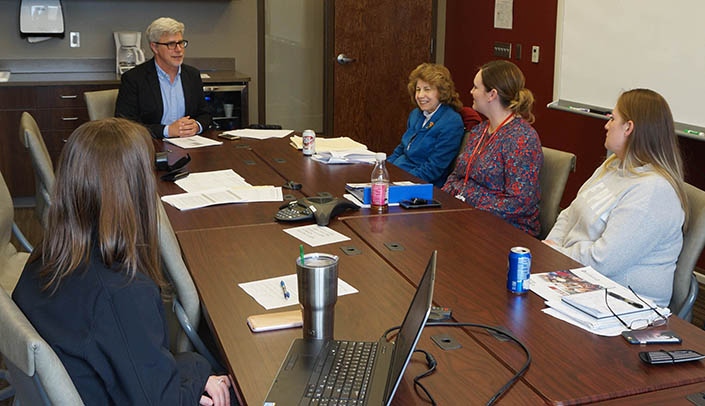Four UNMC students spent this past semester in an interprofessional rural rotation in the East Central District Health Department (ECDHD) in the Columbus, Neb., area to focus on mental health.
Three College of Nursing students and one College of Public Health student, all in master’s programs, examined public health-oriented solutions to address mental health needs in rural Nebraska.
The students were:
- Amber Hanson, of Auburn, Neb.; Nikki Holden, of Madison, Neb.; and Rachel Mann, of Norfolk, Neb., who are studying to become psychiatric mental health nurse practitioners.
- Grant Brueggeman, of Auburn, Neb., who just received his master’s of public health degreeand is the interim director of the Southeast District Health Department. He wants to attend medical school to become a primary care provider in his hometown.
As part of the rotation, students conducted key informant interviews, reviewed existing county-level data, and conducted literature reviews to formulate intervention strategies to address rural youth suicide. They also participated in class presentations about rural mental health lead by Nikki Carritt, deputy director of the Nebraska Area Health Education Center, and Joe Blankenau, Ph.D., professor, political science, Wayne State College.
Teenage suicide is a significant health challenge within the ECDHD, according to a 2016 Youth Risk Behavior survey of 1,361 students.
The survey found that during a 12-month period;
Out of the 1,267 high school students who replied, 150 reported having attempted suicide at least once — 34 of whom attempted two or more times – and 47 needed medical treatment.
The students found there is a shortage of mental health providers to work with adolescents, families, and communities in the district, which includes Boone, Colfax, Nance and Platte counties. Stigma and lack of information also are potential barriers to accessing resources. They cite a need for more providers and educational resources.
Brueggeman said the most valuable lesson he learned was that collaboration between various health care disciplines is critical. “Perspectives from both clinical and public health professionals provided valuable insight into youth suicide prevention methods and future community engagement to reduce youth suicide mortality within the East Central District Health Department region.”
Hanson said she was surprised at the number of youth living in a small area of Nebraska who have attempted suicide. “Early screening and interventions are important in mental health and I believe this project will work toward better outcomes involving Nebraska youth and mental health concerns.”
